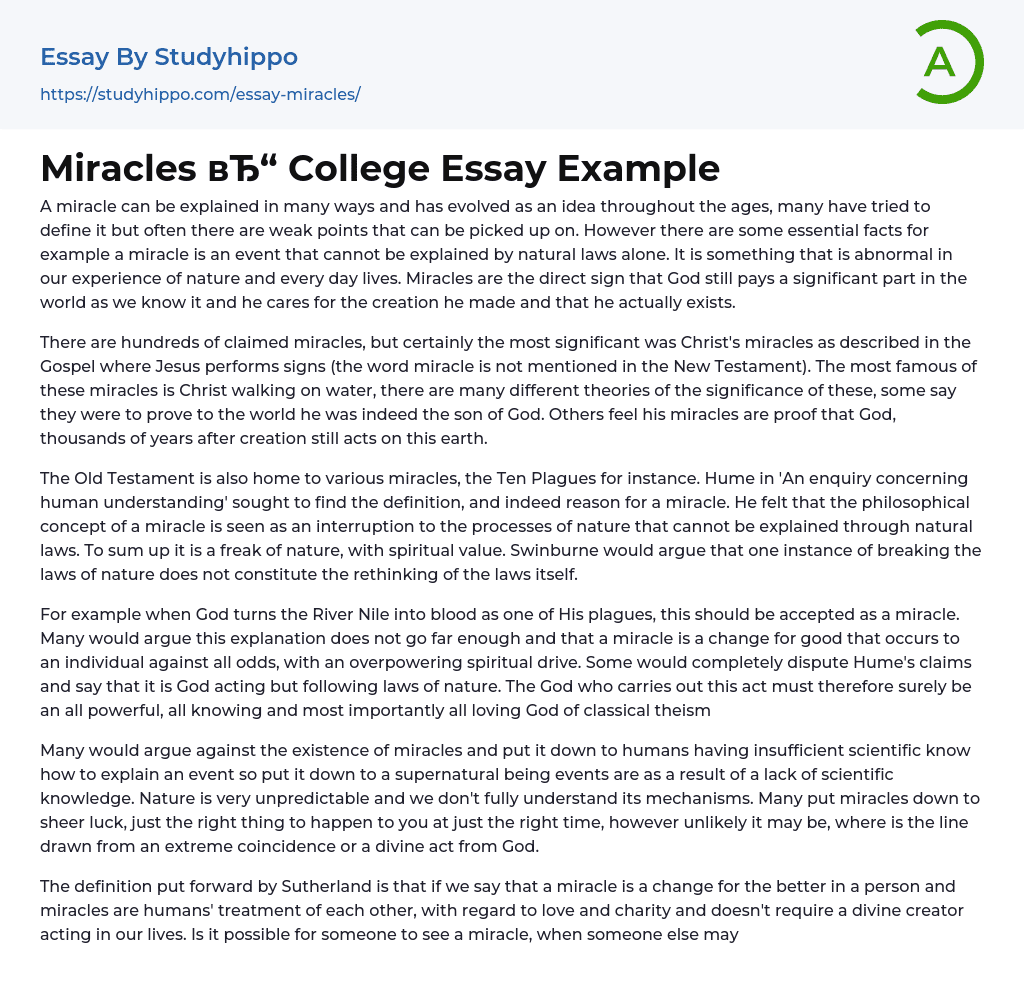A miracle can be explained in many ways and has evolved as an idea throughout the ages, many have tried to define it but often there are weak points that can be picked up on. However there are some essential facts for example a miracle is an event that cannot be explained by natural laws alone. It is something that is abnormal in our experience of nature and every day lives. Miracles are the direct sign that God still pays a significant part in the world as we know it and he cares for the creation he made and that he actually exists.
There are hundreds of claimed miracles, but certainly the most significant was Christ's miracles as described in the Gospel where Jesus performs signs (the word miracle is not mentioned in the New Testament). The most famous of these m
...iracles is Christ walking on water, there are many different theories of the significance of these, some say they were to prove to the world he was indeed the son of God. Others feel his miracles are proof that God, thousands of years after creation still acts on this earth.
The Old Testament is also home to various miracles, the Ten Plagues for instance. Hume in 'An enquiry concerning human understanding' sought to find the definition, and indeed reason for a miracle. He felt that the philosophical concept of a miracle is seen as an interruption to the processes of nature that cannot be explained through natural laws. To sum up it is a freak of nature, with spiritual value. Swinburne would argue that one instance of breaking the laws of nature does not constitute the
rethinking of the laws itself.
For example when God turns the River Nile into blood as one of His plagues, this should be accepted as a miracle. Many would argue this explanation does not go far enough and that a miracle is a change for good that occurs to an individual against all odds, with an overpowering spiritual drive. Some would completely dispute Hume's claims and say that it is God acting but following laws of nature. The God who carries out this act must therefore surely be an all powerful, all knowing and most importantly all loving God of classical theism
Many would argue against the existence of miracles and put it down to humans having insufficient scientific know how to explain an event so put it down to a supernatural being events are as a result of a lack of scientific knowledge. Nature is very unpredictable and we don't fully understand its mechanisms. Many put miracles down to sheer luck, just the right thing to happen to you at just the right time, however unlikely it may be, where is the line drawn from an extreme coincidence or a divine act from God.
The definition put forward by Sutherland is that if we say that a miracle is a change for the better in a person and miracles are humans' treatment of each other, with regard to love and charity and doesn't require a divine creator acting in our lives. Is it possible for someone to see a miracle, when someone else may dispute this? Gareth Moore suggests that a miracle occurs when no explanation can be given. This rejects the concept that God, who acts
in the world, so suffers criticisms from religious believers.
Another view of miracles is that they are `events caused by a God within the laws of nature'. The God of Classical Theism surely must have brought about the event of a divine miracle for the greater good. However, this explanation of miracles falls when there is a distinct lack of proof to back it up. Holland tells the story of a child who clambers onto a rail track as a train is fast approaching only for the driver to have a sudden stroke and the train to abruptly stop, is this a miracle or incredible luck? People who believe in divine intervention will say yes it must be and people who don't believe in it will say it could just as likely be luck as a miracle occurring.
The notion that miracles act within the boundaries of law and nature often takes from the idea of a miracle, being a spectacular act of God. To sum up this idea of a miracle is entirely up to the people involved, such small miracles will not suffice for most in believing in a miracle. Many would accept a miracle has to be out of this world the coined phrase "awe and wonder" has been used top describe it and this fits most peoples criteria of a miracle.
- Afterlife essays
- Atheism essays
- Bible essays
- Buddhism essays
- Christian Worldview essays
- Christianity essays
- Confession essays
- Cosmological Argument essays
- Deism essays
- Devil essays
- Existence of God essays
- Faith essays
- Freedom Of Religion essays
- God essays
- Hinduism essays
- Immortality essays
- Islam essays
- Jainism essays
- Jews essays
- Judaism essays
- Miracle essays
- Monk essays
- Monotheism essays
- New Testament essays
- Old Testament essays
- Pilgrimage essays
- Puritans essays
- Revelation essays
- Ritual essays
- Salvation essays
- Sin essays
- Sinners essays
- Soul essays
- Taoism essays
- Temple essays
- Theology essays
- Adam And Eve essays
- Baptism essays
- Catholic Church essays
- Christian essays
- Church essays
- Crucifixion Of Jesus essays
- Crusades essays
- Elizabeth essays
- Eucharist essays
- God The Father essays
- Holy Spirit essays
- Jesus Christ essays
- Lord essays
- Pope essays




